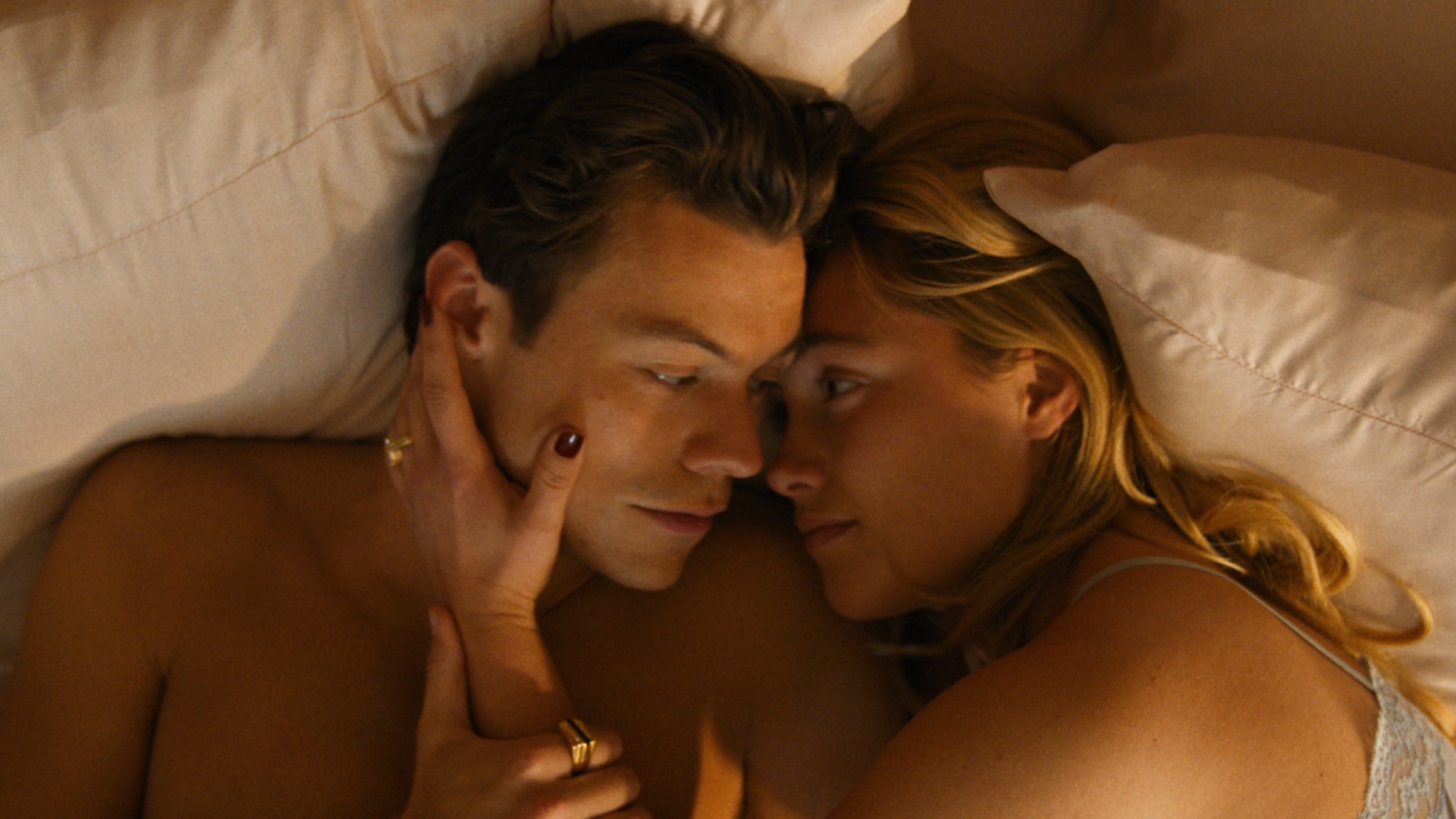GamesRadar+ Verdict
Controversies aside, a handsome, easily digested, thematically relevant conversation-starter that marks another success for Wilde as director.
Why you can trust GamesRadar+
"Chaos," shudders Chris Pine’s Frank, the charming-slash-menacing leader of the community at the heart of Olivia Wilde’s psychological thriller. "A nasty word." It’s certainly a word that could be used to describe the pre-release headlines, discourse and tea-spilling surrounding Don’t Worry Darling’s casting changes, on-set relationships, and competing publicity narratives.
A distraction from, or overshadowing of, a film that aims to unpack relevant conversations around gender politics, female allyship, and gaslighting? Or a buzz generator that might push more people into cinemas to see it out of rubbernecking curiosity? Either way, the themes of Don't Worry Darling are as pertinent to the chatter surrounding its creation as they are to current events and the recent erasure of female body autonomy.
Diving straight into a cold open at a raucous cocktail party, it centers on ’50s housewife Alice (Florence Pugh), whose personal wonderland is the new-build utopian desert town of Victory. There, every morning, all the husbands tootle off to work at a shadowy corporation that ‘develops progressive materials’ under a blanket of secrecy while the women shop, clean, cook, and gossip.
Alice’s marriage to suave Jack (Harry Styles) appears idyllic, ripped straight from the pages of an aspirational magazine. He watches her with adoring eyes at company shindigs. They have the sort of urgent, hot sex that destroys crockery. And she takes as much pleasure from her domestic routine as she does from his ministrations. Even her fun-loving next-door neighbor and friend, Bunny (Wilde), marvels at her perfect life.
So why question the status quo when another wife, Margaret (KiKi Layne) makes a scene at a garden party and warns, "We shouldn’t be here"? Or when CEO Frank and his imperious wife (Gemma Chan) exude cult-leader vibes with their self-aggrandizing speeches? Or when confusing images flash into Alice’s consciousness and she begins to experience suffocating visions? As all the men in town will tell her, any dissociative feelings are merely hysteria, tiredness, illness or a case of being "over-served" with alcohol…
Slapped with promotional hashtag #DontSpoilIDarling, Wilde’s film successfully builds a delicate house of cards around her protagonist that, once tumbled, will likely provide viewers with plenty to debate about emasculation, patriarchal society, and emancipation come the end credits. Spoilery details won’t be revealed here; suffice to say that breadcrumbed clues are deftly trailed all the way to the third-act rug-pull. Wilde makes suggestive use of dissonant sound design, repeated ocular imagery, dreamy lens flares, and some period details that are slightly… off.
Meanwhile, the efficient script constantly asks viewers to sense check the views of Victory’s inhabitants as they rationalize the era’s gender divide. "There is beauty in control," Chan’s ballet-teaching ice queen tells the women as she drills them in pliés. And then there’s Frank’s radio hour, broadcast to all homes during wifely chores, where he insists, "You are worthy of the life you deserve." Another tricky word: is "deserve" something to be read as reward or punishment?
Pugh – in every scene – essays another accomplished, full-bodied performance, bringing viewers along with her on a journey from flirtatious to fearful. She’s required to disintegrate then galvanize – a trick that does at times evoke the emotional trajectory she nailed in Midsommar. Styles is suitably charming if blank as Jack, his real-life heartthrob status-enhancing his character’s dreamboat qualities rather than detracting from them.
Pine seems to have the most fun, though, as a silver-tongued guru whose compliments and advice are delivered as smiling threats. A scene where he and Pugh face off over a dining table crackles with electricity. Later, a party in which he forces Styles to dance like a marionette genuinely disquiets.
Though Don’t Worry Darling is crisply shot and scored (with Kubrickian leanings), its tension and dramatic impact depend, inescapably, on an audience’s own dissociation – from previous sci-fi and horror cinema. While Wilde’s thriller feels zeitgeist-y due to its release landing amid a reversal of women’s rights, anyone with a passing knowledge of Nolan, the Wachowskis, Argento, Peele or Bryan Forbes might unpick the mystery at the core of Victory a few steps ahead of Alice.
Still, it’s a big career swing for Wilde, following 2019’s teen-com Booksmart with something so thematically and stylistically different – and ambitious. And like her debut, Don’t Worry Darling showcases a director with an assured hand and a commercial eye. As glossy as any of the surfaces that Alice polishes so diligently each day, it’s a feminist film that asks viewers to evaluate their own social complicity in oppression, while not skimping on really great costumes, gorgeous cars or horny sex scenes.
don't Worry Darling is out on September 23, 2022. For more, check out our list of the most exciting upcoming movies heading your way soon.
More info
| Genre | Thriller |
Jane Crowther is a contributing editor to Total Film magazine, having formerly been the longtime Editor, as well as serving as the Editor-in-Chief of the Film Group here at Future Plc, which covers Total Film, SFX, and numerous TV and women's interest brands. Jane is also the vice-chair of The Critics' Circle and a BAFTA member. You'll find Jane on GamesRadar+ exploring the biggest movies in the world and living up to her reputation as one of the most authoritative voices on film in the industry.



